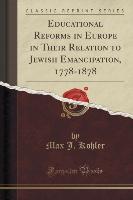Educational Reforms in Europe in Their Relation to Jewish Emancipation, 1778-1878 (Classic Reprint)
BücherAngebote / Angebote:
Excerpt from Educational Reforms in Europe in Their Relation to Jewish Emancipation, 1778-1878
It has been pointed out that about 1740, in the days of Moses Mendelssohn's youth, merely carrying a German book around in the Berlin Jewish community was an offense punishable by expulsion from the city, and frequent exceptions among the Sephardic Jews and isolated Ashkenasic Jews to this prevailing ignorance of the vernacular, during this period, did not change the average condition. It is therefore not strange that leaders in the work of Jewish emancipation during the fifty or sixty years following our American Declaration of Independence, such as Dohm. Wm. von Humboldt, Mirabeau, Joseph II, Napoleon I and Lewis Way, among Christians, and Mendelssohn, Friedlander, Wessely, Jacobsohn, Perl, Levinsohn, Max Lilienthal and Benjamin Schwarzfeld, among Jews, should have vigorously emphasized this need, in and out of season. It is with their plans and activities that we chiefly deal herein. In considering the subject, however, we should not forget that systems of compulsory public education were introduced even in England and France only within the past few decades, and that our own country, Prussia and the Germanic Empire were long exceptions in these activities, following, in fact, Jewish precedents - the matter of elementary instruction being commonly left for voluntary handling by the various ecclesiastical organizations, and the ignorant parents themselves. It was a new conception of the proper scope of State activity, born of newly developed ideas of rights and duties of citizenship, to recognize with Eugene Lawrence: "When falls the common school system, freedom perishes and reason dies... So long as our public schools flourish the country is safe."
Emperor Joseph II, in his Jewish Toleration Edicts of 1781 and thereafter, doubtless influenced by Dohm's book, combined with his ameliorating provision for the Jews, ordinances for their compulsory education in the German vernacular, or Hungarian vernacular, as we shall presently see, his theory being: "What we want is that all our subjects should be able to read, write and sum. For this, learned men are scarcely necessary."
About the Publisher
Forgotten Books publishes hundreds of thousands of rare and classic books. Find more at www.forgottenbooks.com
This book is a reproduction of an important historical work. Forgotten Books uses state-of-the-art technology to digitally reconstruct the work, preserving the original format whilst repairing imperfections present in the aged copy. In rare cases, an imperfection in the original, such as a blemish or missing page, may be replicated in our edition. We do, however, repair the vast majority of imperfections successfully, any imperfections that remain are intentionally left to preserve the state of such historical works.
Folgt in ca. 5 Arbeitstagen
